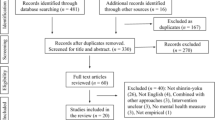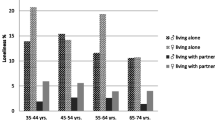Abstract
Hajj is a spiritual journey and religious ritual which is performed every year. Here, we evaluate the psychological effect of the Hajj. Using General Health Questionnaire (GHQ) questionnaire with 28 questions, the mental health of the pilgrims was assessed before and after the journey. A total of 154 people were questioned, 72 pilgrims (47%) were male. The mean GHQ score of participants before the journey was 50.1 and after the journey was 49.5 (P = 0.248). The results of analysis of variance and generalized estimating equation indicated that the GHQ scores had no significant difference before and after the journey.
Similar content being viewed by others
References
Aljoudi, A. S. (2013). A University of the Hajj? The Lancet,382, 1689.
Clingingsmith, D., Khwaja, A. I., & Kremer, M. (2009). Estimating the impact of The Hajj: Religion and tolerance in Islam’s global gathering. The Quarterly Journal of Economics,124, 1133–1170.
Dewiyanti, D., & Kusuma, H. E. (2012). Spaces for Muslims spiritual meanings. Procedia-Social and Behavioral Sciences,50, 969–978.
Ebrahimi, A., Molavi, H., Moosavi, G., Bornamanesh, A., & Yaghobi, M. (2007). Psychometric properties and factor structure of General Health Questionnaire 28 (GHQ-28) in Iranian psychiatric patients. Journal of Research in Behavioural Sciences,5, 5–11.
Emamian, M. H., Ebrahimi, H., Ghorbani, K., Honarvar, M., & Shirazi, P. (2014). Improvement of Hajj pilgrims’ health status in Hajj-e-Tamattu. Journal of Babol University of Medical Sciences,16, 70–76.
Güngörmüş, Z., Tanriverdi, D., & Gündoǧan, T. (2015). The effect of religious belief on the mental health status and suicide probability of women exposed to violence. Journal of Religion and Health,54, 1573–1583.
Hashemi Nazari, S. S., Khosravi, J., Faghihzadeh, S., & Etemadzadeh, S. H. (2007). A survey of mental health among fire department employees by GHQ-28 questionnaire in 2005, Tehran-Iran. Hakim Research Journal,10, 56–64.
Hassan, S. H. (2015). Effects of religious behavior on health-related lifestyles of Muslims in Malaysia. Journal of Religion and Health,54, 1238–1248.
Heydari Fard, J., & Bagheri-Nesami, M. (2012). The relationship between general health and religious coping in elderly residing at homes. Life Science Journal,9, 3205–3210.
Johnstone, B., Yoon, D. P., Cohen, D., Schopp, L. H., McCormack, G., Campbell, J., et al. (2012). Relationships among spirituality, religious practices, personality factors, and health for five different faith traditions. Journal of Religion and Health,51, 1017–1041.
Lindenthal, J. J., Myers, J. K., Pepper, M. P., & Stern, M. S. (1970). Mental status and religious behavior. Journal of Scientific Study of Religion,9, 143–149.
Malakouti, S. K., Fatollahi, P., Mirabzadeh, A., & Zandi, T. (2007). Reliability, validity and factor structure of the GHQ-28 used among elderly Iranians. International Psychogeriatrics,19, 623–634.
McIntosh, I. B., Power, K. G., & Reed, J. M. (1996). Prevalence, intensity and sex differences in travel related stressors. Journal of Travel Medicine,1996(3), 96–102.
Memish, Z. A. (2010). The Hajj: Communicable and non-communicable health hazards and current guidance for pilgrims. Eurosurveillance Weekly,15, 19671.
Nam, S. (2013). The effects of religious attendance and obesity on health by race/ethnicity. The Osong Public Health and Research Perspectives,4, 81–88.
Rafiq, S. M., Rashid, H., Haworth, E., & Booy, R. (2009). Hazards of hepatitis at the Hajj. Travel Medicine and Infectious Disease,7, 239–246.
Tavabi, A. A., & Iran-Pour, E. (2011). The association between religious beliefs and mental health amongst medical students. Journal of the Pakistan Medical Association,61, 135–138.
Author information
Authors and Affiliations
Corresponding author
Additional information
Publisher's Note
Springer Nature remains neutral with regard to jurisdictional claims in published maps and institutional affiliations.
Rights and permissions
About this article
Cite this article
Fateh, M., Mousavi, S.A., Sohrabi, M.B. et al. The Effect of Hajj Trip on Mental Health: A Longitudinal Study. J Relig Health 59, 1319–1326 (2020). https://doi.org/10.1007/s10943-019-00825-7
Published:
Issue Date:
DOI: https://doi.org/10.1007/s10943-019-00825-7




